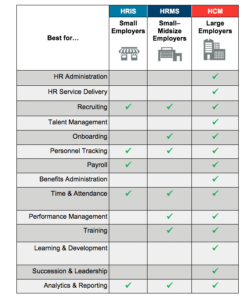As many as 73% of U.S. employers have migrated their HR processes to the cloud. Another 1 out of every 7 employers are considering switching to a different HR system.
Why automate HR processes? How in the world do you choose the right HR system for your organization? This post gives you the practical advice you need to make an informed decision.
Benefits of HR Automation
A CareerBuilder survey that included employers who automated part of their talent acquisition and management processes revealed the following advantages:
- 93% of respondents reported they saved time and increased efficiency
- 71% said HR automation improved the candidate experience
- 69% found errors decreased
- 67% saved money and resources
- 60% reported HR automation improved employee experiences
Which system? HRIS vs. HRM vs. HCM
The terms human resource information system (HRIS), human capital management (HCM), and human resource management system (HRMS) are often used interchangeably. However, there are noteworthy technical differences between them.

5 Tips for Evaluating Vendors
A search on “HR software” yields 9.3 million results! Wowza, that’s a lot of vendors and information to sort through. Here are the key factors to consider when it comes to choosing HR solutions for your organization.
- Needs & Wants — There are core HR functions that you must do in order for your organization to be viable. Then there are things you want to do to improve HR practices. Depending on your budget, you may want to start simply and scale up over time. Or, you may prefer a system with some flexibility to take on more tasks to support your organization’s strategic goals. Factor this into your list of minimum system requirements and additional desired features.
- Constraints — You’re used to having parameters relating to your projects and resources. So, it makes sense that there will also be internal factors that affect software selection. Instead of thinking of this as a negative, consider how it conveniently helps narrow down your pool of choices!
- What is your budget?
- Do you have technical limitations?
- Is time a factor?
- Form a Committee — Choosing an HR system on your own is madness. Plus, it may not meet your organization’s and employees’ expectations. Have a representative from your IT, accounting, HR, Training, and Operations departments and at least one other manager and employee representative be part of the evaluation team.
- Demo It — Let’s face it, sitting through sales calls isn’t your favorite way to spend your time, but it’s invaluable when you’re assessing different systems. You can ask your questions, see how it really works, and get a feel for the vendor. Prepare your evaluation criteria ahead of time so that you and your committee members can score vendors objectively.
- Consider Value-added Extras — Some HR system providers also augment the software with personalized assistance. For example, KPA’s Ask the HR Expert service allows clients to connect with HR compliance professionals and attorneys who provide a greater degree of protection than software alone.
Additional Resources
